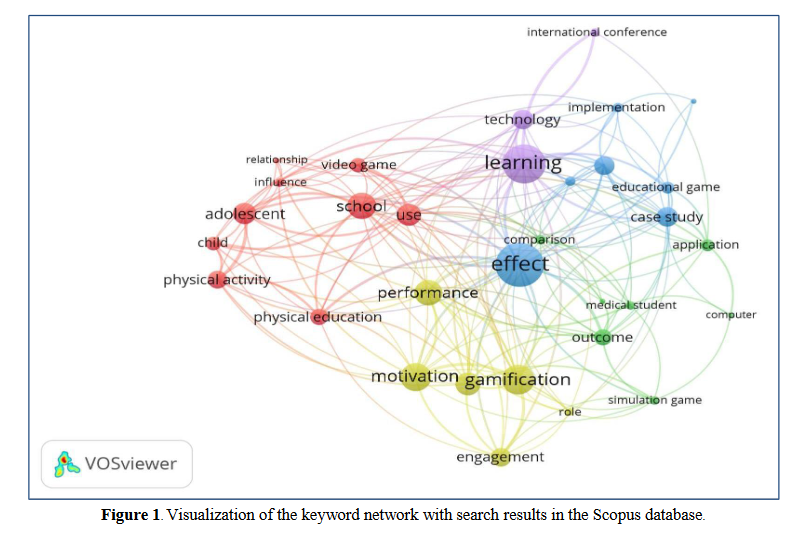Game Method Based on Genre Game as Higher Educational Learning: Systematic Literature Review with VOSviewer
DOI:
https://doi.org/10.53848/ssstj.v10i1.411Keywords:
Game method, Student, Higher education, Systematic literature reviewAbstract
Game methods today have often been applied in several functions in the presentation in the realm of learning in multi-disciplines. The application of gaming methods is very varied to provide a different presentation for students to obtain a goal in the organization. In this case, the purpose of an organization is to increase the productivity and quality of a student. This paper discusses the methods and domains that are often used in the realm of education to achieve a goal. Systematic Literature Review is used in the application of research methods by finding selected articles with selected themes. In sorting the selected journals, inclusion and exclusion were also applied to obtain better article search results, and some 1,256 articles were found in the process, the application of filtering with
exclusion and inclusion in this phase will result in 265 articles that fall into the category of candidate study discussion. The journal articles conclude that there are only 20 articles that can answer the questions in this paper. The results in this paper state that the Gaming Method in the realm of education is varied and the familiar game genre grouping used in the selected article is Simulation Game. The entire database in this research paper was obtained directly from the largest international journal alert database, namely Scopus. This is done by the database under the auspices of Elsevier as an organization or company publishing international scientific publications based in Amsterdam, the Netherlands since 1880.
References
Abouhashem, A. , Abdou, R. M. , Bhadra, J. ,Santhosh, M. , Ahmad, Z. , & Al- Thani, N. J.(2021) . A distinctive method of online interactive learning in STEM education.Sustainability, 13(24), 1-17.doi:10.3390/su132413909
Agbo, F. J., Oyelere, S. S., Suhonen, J., & Laine, T. H. (2021). Co-design of mini games for learning computational thinking in an online environment. Education and Information Technologies, 26(5), 5815-5849.doi:10.1007/s10639-021-10515-1
Dankbaar, M. E. W., Richters, O., Kalkman, C. J.,Prins, G., ten Cate, O. T. J., van Merrienboer, J. J. G. , & Schuit, S. C. E. ( 2017) . Comparative
effectiveness of a serious game and an e-module to support patient safety knowledge and awareness. BMC Medical Education, 17(1), 1-
doi:10.1186/s12909-016-0836-5
Eukel, H. N., Frenzel, J. E., & Cernusca, D. (2017).Educational gaming for pharmacy students - Design and evaluation of a diabetes- themed
escape room. American Journal of Pharmaceutical Education, 81(7).doi:10.5688/ajpe8176265
Ferebee, S. S. ( 2010) . Successful persuasive technology for behavior reduction: Mapping to Fogg’ s Gray Behavior Grid. Persuasive
Technology, 6137, 70-81.
Gamero, M. G., García-Ceberino, J. M., Ibáñez, S. J.,& Feu, S. (2021). Influence of the pedagogical model and experience on the internal and
external task load in school basketball. International Journal of Environmental Research and Public Health, 18( 22) .
doi:10.3390/ijerph182211854
Guo, J. L., Hsu, H. P., Lai, T. M., Lin, M. L., Chung, C. M. , & Huang, C. M. ( 2021) . Acceptability evaluation of the use of virtual reality games in
smoking-prevention education for high school students: Prospective observational study. Journal of Medical Internet Research, 23(9), 1-14. doi:10.2196/28037
Harjali, H. (2011). Urgensi pendekatan multikultur dalam pendidikan. Cendekia: Jurnal Kependidikan dan Kemasyarakatan, 9(2), 205-216.
Hidayat, R. (2018). Game-based learning: Academic games sebagai metode penunjang pembelajaran kewirausahaan. Buletin Psikologi, 26(2), 71-85.doi:10.22146/buletinpsikologi.30988
Ho, F. K., Tung, K. T. S., Wong, R. S., Chan, K. L., Wong, W. H. S., Ho, S. Y., ... Ip, P. (2021). An internet quiz game intervention for adolescent alcohol drinking: A clustered RCT. Pediatrics,148(6). doi:10.1542/peds.2021-051005
Ilaria, V. , & Emanuela, R. ( 2019) . Elements and methods of organization, design and management of extracurricular sports activities. Journal of Physical Education and Sport, 19,1767-1772. doi:10.7752/jpes.2019.s5259
Ismail, S. N. , Ramli, A. , & Aziz, H. A. ( 2021) . Influencing factors on safety culture in mining industry: A systematic literature review approach. Resources Policy, 74. doi:10.1016/j.resourpol.2021.102250
Jingga, F., Kosala, R., Ranti, B., & Supangkat, S. H. (2019) . IT Governance implementation in Indonesia: A systematic literature review.International Journal of Scientific and Technology Research, 8(10), 2074-2079.
Macías-Guillén, A., Díez, R. M., Serrano-Luján, L., & Borrás- Gené, O. ( 2021) . Educational Hall Escape: Increasing motivation and raising emotions in higher education students. Education Sciences, 11(9).doi:10.3390/educsci11090527
Mansoory, M. S., Khazaei, M. R., Azizi, S. M., & Niromand, E. ( 2021) . Comparison of the effectiveness of lecture instruction and virtual reality-based serious gaming instruction on the medical students’ learning outcome about approach to coma. BMC Medical Education,21(1), 1-7. doi:10.1186/s12909-021-02771-z
Molina-Torres, G., Sandoval-Hernández, I., Ropero-Padilla, C. , Rodriguez- Arrastia, M. , Martínez-Cal, J., & Gonzalez-Sanchez, M. (2021). Escape Room vs. traditional assessment in physiotherapy students’ anxiety, stress and gaming experience: A comparative study.International Journal of Environmental Research and Public Health, 18(23).doi:10.3390/ijerph182312778
Novayani, W. ( 2019) . Game genre for history education game based on pedagogy and learning content. Jurnal Komputer Terapan,
(2), 54-63.
Pereira, A. S., & Wahi, M. M. (2021). Development and testing of a roleplaying gamification module to enhance deeper learning of case
studies in an accelerated online management theory course. Online Learning Journal, 25(3),101-127. doi:10.24059/olj.v25i3.2273
Pham, T., Beloncle, F., Piquilloud, L., Ehrmann, S., Roux, D., Dessap, A. M., & Carteaux, G. (2021). Assessment of a massive open online course
( MOOC) incorporating interactive simulation videos on residents’ knowledge retention regarding mechanical ventilation. BMC Medical
Education, 21(1), 1-12. doi:10.1186/s12909-021-03025-8
Pimentel, J., Cockcroft, A., & Andersson, N. (2021). Impact of game jam learning about cultural safety in Colombian medical education: A
randomised controlled trial. BMC Medical Education, 21(1), 1-12. doi:10.1186/s12909-021-02545-7
Popović, M. , Vladimir, K. , & Šilić, M. ( 2018) .Application of social game context to teaching mutual exclusion. Automatika, 59(2), 208-219.
doi:10.1080/00051144.2018.1522462
Sáiz- Manzanares, M. C. , Martin, C. F. , Alonso-Martínez, L., & Almeida, L. S. (2021). Usefulness of digital game- based learning in nursing and
occupational therapy degrees: A comparative study at the University of Burgos. International Journal of Environmental Research and Public
Health, 18(22).doi:10.3390/ijerph182211757
Saputra, H., Hanif, A. S., Sulaiman, I., & Ningrum,D. T. M. (2021). The effect of traditional games and drill with motor ability on skills (running,
jumping, overhand throw and catching) at elementary school. International Journal of Human Movement and Sports Sciences, 9( 6) ,
-1103. doi:10.13189/saj.2021.090603
Schlickum, M. , Hedman, L. , & Felländer- Tsai, L. (2016). Visual-spatial ability is more important than motivation for novices in surgical
simulator training: A preliminary study.International Journal of Medical Education, 7,56-61. doi:10.5116/ijme.56b1.169
Stiller, K. D. , & Schworm, S. (2019). Game-based learning of the structure and functioning of body cells in a foreign language: Effects on
motivation, cognitive load, and performance.Frontiers in Education, 4, 1-19.doi:10.3389/feduc.2019.00018
Tomov, D. , Tomova, D. , & Atanasov, D. ( 2021) .Tennis ball as a factor in the initial tennis training of junior high school ( 12- year- old)
students. Journal of Physical Education and Sport, 21(5), 2745-2751. doi:10.7752/jpes.2021.05365
Vusić, D. , Bernik, A. , & Geček, R. ( 2018) . Instructional design in game based learning and applications used in educational systems.
Technical Journal, 12(1), 11-17.
Winatha, K. R., & Setiawan, I. M. D. (2020). Pengaruh game- based learning terhadap motivasi dan prestasi belajar. Scholaria: Jurnal Pendidikan dan Kebudayaan, 10(3), 198-206.doi:10.24246/j.js.2020.v10.i3.p198-206
Yu, Y., Mo, P. K. H., Zhang, J., Li, J., & Lau, J. T. F. (2021) . Impulsivity, self- control, interpersonal influences, and maladaptive cognitions as
factors of internet gaming disorder among adolescents in China: Cross-sectional mediation study. Journal of Medical Internet Research,
(10). doi:10.2196/26810













